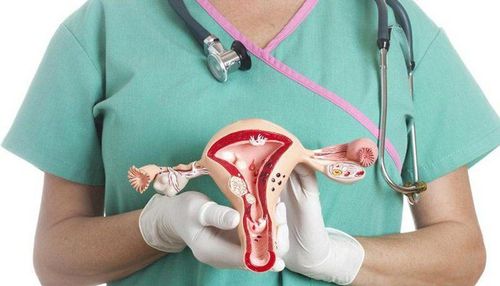This is an automatically translated article.
The article was professionally consulted by BSCK II Phung Thi Phuong Chi - Oncologist - Oncology Center - Vinmec Central Park International General Hospital. The doctor has 20 years of experience in the field of oncology.Early-stage ovarian cancer often has atypical manifestations, even very difficult to recognize, but has the highest probability of being successfully treated. Recognizing early signs of ovarian cancer helps to promptly treat and increase the likelihood of recovery.
1. Early stage ovarian cancer
Ovarian cancer is a malignant tumor that originates in the ovaries. The cells in this type of tumor are abnormal cells that divide neither according to the needs of the body nor under any control of the body.There are many types of ovarian cancer:
Ovarian cancer that arises from the surface of the ovary (also called carcinoma): The most common type. Ovarian cancer begins in the cells that produce eggs (germ cells). Ovarian cancer that originates from the ovarian stroma: This type is less common. Ovarian cancer has 4 stages:
Stage 1: The tumor is confined to the ovary or fallopian tube and has not spread to other organs. This is the easiest stage to treat and has the highest chance of success. Overall, women who are diagnosed with stage 1 ovarian cancer with successful treatment have a 90% chance of surviving five years. Stage 2: The tumor is still in the ovaries and fallopian tubes but has begun to spread to nearby organs in the pelvis. The 5-year survival rate if treated during this stage is 70%. Treatment usually includes both surgery and chemotherapy. Stage 3: The ovarian cancer tumor has begun to spread beyond the pelvis and invade the peritoneum in the abdomen. Stage 4: Cancer has spread far beyond the ovaries or fallopian tubes, to organs throughout the body. Treatment of ovarian cancer at a very early stage can only remove one ovary and fallopian tube, preserving reproductive function, moreover, improving the patient's chances of survival as well as survival time. .
2. Early signs of ovarian cancer
Recognizing the early signs of ovarian cancer has many benefits, however, it is not easy. The reason is that ovarian cancer often has no typical signs, is often very vague, and or the symptoms are only apparent when it is late.Some warning signs and symptoms of early ovarian cancer include:
Abdominal and pelvic pain: The appearance of sharp and persistent pain in the abdomen or pelvis, different from the pain of women. indigestion. Moreover, if a woman is not on her period, it can be the first sign that you are about to face ovarian cancer. As cancer cells grow, it can affect other organs and organs around the tumor area, most commonly the abdomen and pelvis, thereby causing abdominal pain. Lower back pain: There are many causes of back pain, but if it is not due to any physical illness or disease of bones and joints such as ligament strain, osteoporosis, arthritis... it's good. You should get checked out early. Indigestion, flatulence: Frequent bloating, even when you have not eaten anything. Having indigestion or bloating doesn't mean you have ovarian cancer, but if it happens regularly for a long time, you should see your doctor right away. In addition to the digestive system, bloating and indigestion can also be caused by tumors that are growing and compressing the abdomen.

Đầy bụng, khó tiêu có thể là dấu hiệu của ung thư buồng trứng giai đoạn sớm

Bệnh nhân có thể bị đau khi quan hệ tình dục
Please dial HOTLINE for more information or register for an appointment HERE. Download MyVinmec app to make appointments faster and to manage your bookings easily.













